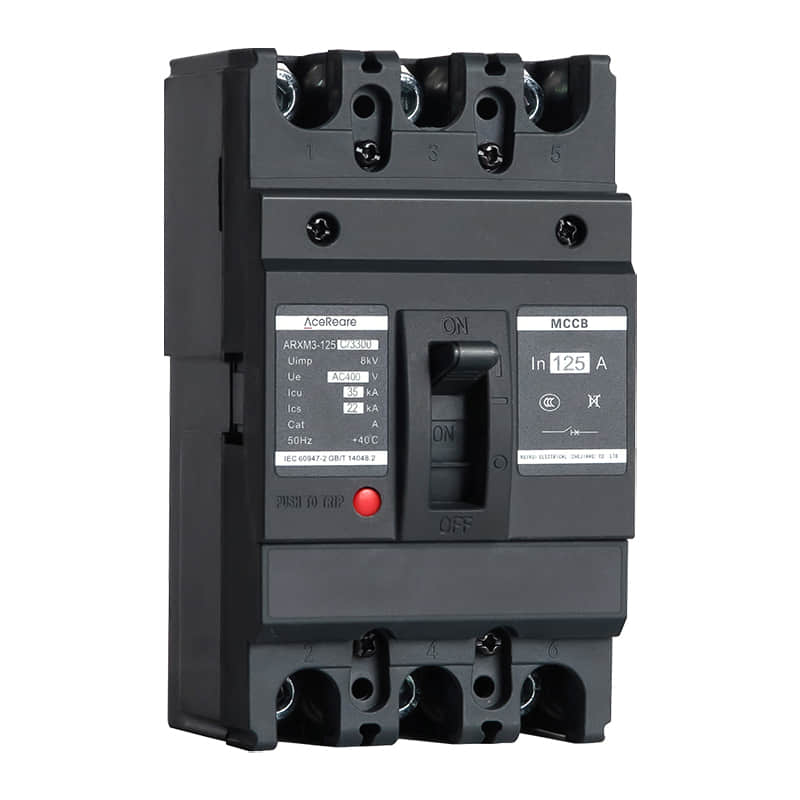
Date | 2024-06-13 03:07:52
Abstract:
This paper explores the advancements and significance of 80 Amp Molded Case Circuit Breakers (MCCBs) in improving electrical safety and efficiency. MCCBs are essential components in electrical systems, offering protection against overloads, short circuits, and other faults. The evolution of MCCB technology has led to enhanced features such as higher breaking capacities, improved sensitivity, and better coordination with other protective devices. This paper delves into the design principles, operational characteristics, and applications of 80 Amp MCCBs, emphasizing their role in ensuring reliable power distribution and safeguarding electrical equipment and personnel. Additionally, it discusses the impact of MCCBs on energy management and the environment, highlighting their contribution to sustainable practices in various industries. Through a comprehensive review of literature and case studies, this paper aims to provide insights into the advancements in 80 Amp MCCBs and their implications for modern electrical systems.
Introduction:
Molded Case Circuit Breakers (MCCBs) play a crucial role in electrical systems by providing protection against overcurrents and ensuring the safety and reliability of power distribution networks. As electrical loads continue to evolve and expand, the demand for MCCBs with higher current ratings and enhanced capabilities has grown significantly. In this context, 80 Amp MCCBs have emerged as versatile solutions for various applications, offering a balance between performance, size, and cost-effectiveness. This paper examines the advancements in 80 Amp MCCBs and their implications for electrical safety, efficiency, and sustainability.
Design Principles and Operational Characteristics:
80 Amp MCCBs are designed based on the same fundamental principles as their lower-rated counterparts but are optimized to handle higher currents without compromising performance or reliability. These devices consist of a trip mechanism, current-carrying contacts, arc extinguishing system, and thermal and magnetic trip units. The trip mechanism responds to abnormal current conditions by opening the circuit, thereby disconnecting the load from the power source. The current-carrying contacts are made of high-quality materials to ensure efficient current conduction and minimal voltage drop. The arc extinguishing system quenches the arc generated during circuit interruption, preventing damage to the contacts and surrounding components. Thermal and magnetic trip units provide overcurrent protection by detecting excessive current levels and initiating the tripping mechanism.
Advancements in 80 Amp MCCBs:
Recent advancements in MCCB technology have led to significant improvements in the performance and functionality of 80 Amp MCCBs. These advancements include:
Higher Breaking Capacities: Modern 80 Amp MCCBs are capable of interrupting fault currents up to several kiloamperes, ensuring reliable protection against short circuits and overloads.
Enhanced Sensitivity: Advanced trip units with adjustable settings allow for precise coordination and selective tripping, reducing the risk of unnecessary shutdowns and downtime.
Compact Design: Miniaturization techniques and innovative engineering approaches have enabled the development of compact and space-saving 80 Amp MCCBs, making them suitable for installations where space is limited.
Communication and Monitoring Capabilities: Some 80 Amp MCCBs are equipped with communication interfaces and built-in monitoring features, enabling remote operation, status monitoring, and predictive maintenance.
Applications and Benefits:
80 Amp MCCBs find widespread applications across various industries and sectors, including commercial buildings, industrial facilities, data centers, and renewable energy installations. These devices provide essential protection for electrical equipment such as motors, generators, transformers, and distribution panels. By preventing costly damage and downtime, 80 Amp MCCBs contribute to increased productivity and operational efficiency. Moreover, their role in enhancing electrical safety helps mitigate the risk of accidents and injuries in the workplace.
Impact on Energy Management and Sustainability:
In addition to improving electrical safety and reliability, 80 Amp MCCBs play a significant role in energy management and sustainability initiatives. By promptly detecting and isolating electrical faults, these devices minimize energy wastage and reduce the environmental impact of electrical systems. Furthermore, their compact design and efficient operation contribute to energy conservation and resource optimization, aligning with global efforts to promote sustainable development and mitigate climate change.
Conclusion:
The advancements in 80 Amp MCCBs represent a significant milestone in the evolution of electrical protection devices, offering enhanced safety, efficiency, and sustainability benefits. By leveraging cutting-edge technologies and innovative design approaches, these devices empower industries and businesses to achieve reliable and resilient power distribution systems. As the demand for electrical safety and efficiency continues to grow, 80 Amp MCCBs are poised to play a central role in shaping the future of electrical engineering and infrastructure.
